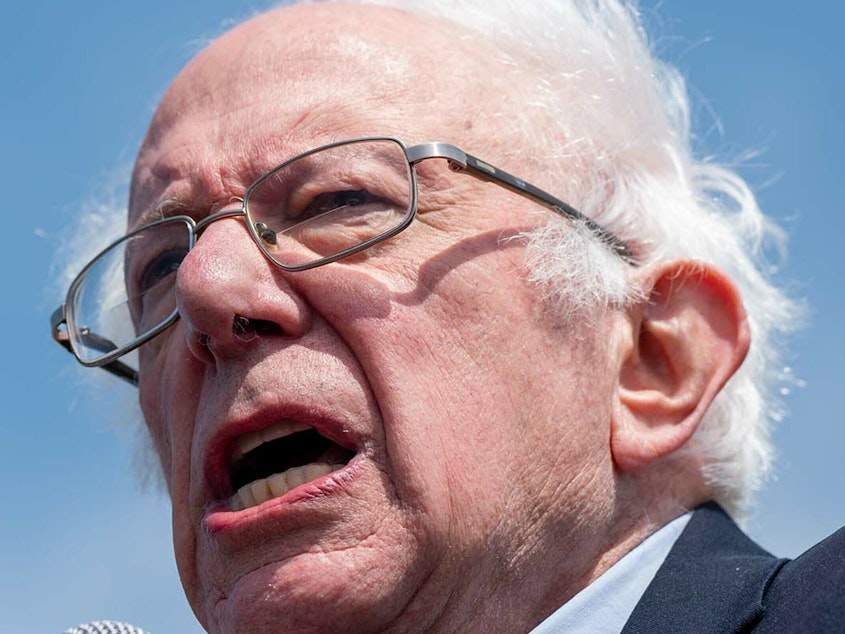Union showdown: Starbucks' Howard Schultz faces Bernie Sanders in the Senate

It could be a hearing for the history books: Billionaire Howard Schultz, the resolutely anti-union architect of Starbucks, gets questioned by Sen. Bernie Sanders, the outspoken champion of the union movement in Congress.
Schultz was once a prominent Democrat hailed as a progressive corporate pioneer of better pay and benefits for service industry workers. Today, he's testifying on allegations that Starbucks has been breaking labor laws as it fights its employees' nationwide unionization push.
"Over the past 18 months Starbucks has waged the most aggressive and illegal union-busting campaign in the modern history of our country," Sanders said in his opening statement. "The fundamental issue we are facing today is whether we have a system of justice that applies to all or whether billionaires and large corporations can break the law with impunity."
Schultz, fresh off his third stint as Starbucks CEO, repeatedly denied any wrongdoing.
"Sir, Starbucks coffee company, unequivocally — and let me set the tone for this very early on — has not broken the law," he said. The statement was met by some laughter from the audience.
Sponsored
"We want to treat everyone with respect and dignity," Schultz continued. "However, I have the right, and the company has the right, to have a preference. And our preference is to maintain the direct relationship we've had with our employees, who we call partners," Schultz said.
The hearing at the Senate Health, Education, Labor, and Pensions committee is chaired by Sanders, an independent from Vermont, and is being streamed online. As it began, a long queue of managers and corporate employees crowded inside, wearing matching t-shirts — as did dozens of Starbucks Workers United members. After Schultz's testimony, lawmakers will also hear from a current and a former Starbucks baristas.
Hundreds of unionized stores, but still no contract
Workers at nearly 300 coffee shops have now voted to join Starbucks Workers United, about 3% of the chain's U.S. locations. The company has shuttered some unionized stores and fired some workers involved in organizing, citing misconduct.
Federal administrative law judges have found Starbucks violated labor laws in at least eight cases, which the company is appealing. Some ruled to reinstate fired workers and issue them back-pay. One said Starbucks engaged in "egregious and widespread misconduct demonstrating a general disregard for the employees."
Sponsored
Starbucks and the union have also failed to negotiate any collective-bargaining contract for any of the unionized stores. Both sides accuse each other of undermining the process.
On Wednesday, noting that the first group of Starbucks workers to win union elections have been waiting more than 460 days to negotiate a first contract, Sanders pressed Schultz to promise that Starbucks would exchange proposals with the union within 14 days of the hearing.
Schultz declined to make any such promise. He did say the company would continue to bargain in good faith in face-to-face sessions, but not in sessions streamed on Zoom as the union has demanded.
Three-time CEO faced threat of subpoena
Schultz touted Starbucks as a worker-focused and generous employer, with pay averaging $17.50 an hour — more than the minimum wage in every state — and benefits, including college tuition and company stock.
Sponsored
"Starbucks is probably one of the best, if not the best first job in America," Schultz said.
Schultz last week stepped down from his third term as Starbucks CEO since the 1980s, staying on as a member of the board and a major shareholder. He had agreed to testify in the Senate after the committee prepared to subpoena him. Sanders rejected Starbucks' offers of other representatives instead.
Schultz first led the coffee chain to huge expansion between 1986 and 2000, returning to the chief executive job from 2008 to 2017 and again last April. In 2019, Schultz grabbed headlines as he explored a presidential run against Donald Trump as an independent.
Last week at the Starbucks shareholder meeting, the new CEO Laxman Narasimhan did not signal any change in the company's stance on unions.
NPR's Mary Yang and Greta Pittenger contributed to this report. [Copyright 2023 NPR]


